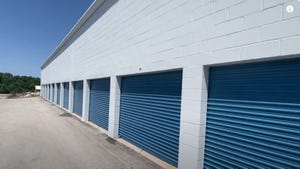The current market fundamentals and historically low interest rates have pushed self-storage property values to record highs and made some owners complacent. Here are a few pointers for calculating the value of your property, plus tips to preserving it in these frothy times.
December 26, 2014
Self-storage brokers spend a lot of time thinking about the value of self-storage properties. The conversations are usually focused on interest rates, capitalization (cap) rates, timing of the real estate cycles, loan-to-value ratios, basis points, cost of capital, net operating income (NOI) and lot of other topics that rarely interest facility owners until they decide to buy or sell a property. There’s a good reason for that: They’re too busy running their storage facilities.
However, there’s a connection between understanding these concepts and running a successful business. Now more than ever, the valueand preservation of valuefor self-storage assets is focused around NOI and whether the operator is maximizing the income. The old rule of thumb that 90 percent of your facility’s value is in the NOI rings true today.
The current market fundamentals, combined with new and well-capitalized players in the industry and historically low interest rates, have pushed facility values to record highs and made some owners complacent. When values climb and cap rates compress, we must think ahead to what happens when the market peaks. How can self-storage owners protect their investment? The risk they face is not only a fluctuation in their NOI but that cap rates will go up faster than their NOI can compensate, creating a loss of value.
With investors looking to maximize their rate of return and limit the amount of risk, it’s only logical to think that if we control our operating expenses, maximize our return on those expenses and increase our revenue that the NOI and cash flow will preserve and possibly increase the value of our asset. This article touches on ways to calculate the value of your property and preserve it in these very frothy times. However, please know the topic of valuation is very subjective, and each deal has nuances that are property-specific.
Calculating Value
Valuation is a professional art, and while mechanical number manipulations are a very importation part of the process, there’s also a large measure of real estate wisdom and experience in developing a precise value range. While I can’t elaborate on every point of judgment necessary to arrive at the valuation, I’ll give you some basics to help you get in the ballpark and make your conversation with a local self-storage expert more productive.
True market valuation takes a much more in-depth look at value, calculating it based not only on income, but on a cost basis and market sales-comparable approach. The cost-basis method compares the cost of replacing the facility in the same market in which it is located; the market sales-comparable method compares the value actually achieved in the marketplace by similar facilities in recent sales.
However, the value of your property to most potential buyers today is largely driven by the NOI and income approach. Your NOI is simply your total revenue minus your operating expenses. The value can then be calculated by dividing the NOI by a market and property-specific cap rate. Remember, you must use industry-standard operating expenses and be realistic about cap rates. Not all properties are 6 percent cap deals!
Without reconciling the value from each of these three independent methods, you can’t be sure you’ve identified the correct value for the property. It’s a complicated process, one requiring the expertise of a professional active in the self-storage investment business.
Value Preservation
The adage “watching your pennies will make you dollars” holds true in the self-storage industry, except we can expect an even greater return when we make an effort to save on operating expenses. You need to understand how to measure those expenses and know which ones will result in the greatest return.
If you’re not already doing so, you need to monetize your property’s general amenities (security cameras, management software, gate-access systems, ancillary profit centers, etc.). Evaluating and upgrading your property’s operational tools (kiosks, online billpay, online reservations, monthly profit-and-loss reports, etc.) will also pay big dividends.
At one time or another, we’ve all looked at our to-do list and thought, “I can do that next month.” Reviewing and analyzing your operating expenses and general amenities isn’t one of those things. Expenses must be reviewed regularly to ensure subtle, yet devastating increases aren’t undermining the value of your property and its cash flow.
First, it’s important to understand the magnitude of each lost dollar of NOI. Assuming cap rates are in the 7 percent to 9 percent range, each dollar of gained NOI will result in an increase of $11 to $14 in property value. If you’re able to save $6,000 per year, you’ll increase the value of your property by $66,000 to $85,000.
With the majority of self-storage expenses falling in three major categoriesreal estate taxes, management and advertising—it’s understandable that yearly escalations in these areas can deteriorate property value. But you must also consider even the smallest costs. Interestingly enough, you don’t have to sell your property to get an immediate gain out of these saved operating expenses; the value will be reflected in the amount you can borrow on the property. Generally speaking, you can borrow 70 percent of the increased value when you refinance. Essentially, you can have your cake and eat it, too!
In today’s ultra-competitive environment, you must rethink how you approach operating expenses and amenities, as they have a direct impact on facility value. Implement a regular process for reviewing and evaluating the return of each. Remember that no box is too small to look for a dollar!
Ben Vestal is president of the Argus Self Storage Sales Network, a national network of real estate brokers who specialize in self-storage. Argus provides brokerage, consulting and marketing services to self-storage buyers and sellers and operates SelfStorage.com, a marketing medium and information resource for facility owners. For more information, call 800.55.STORE; e-mail [email protected]; visit www.argus-selfstorage.com.
About the Author(s)
You May Also Like





